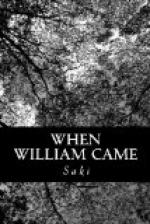The cold irony of the measure struck home with the greater force because its nature was so utterly unexpected. Public anticipation had guessed at various forms of military service, aggressively irksome or tactfully lightened as the case might be, in any event certain to be bitterly unpopular, and now there had come this contemptuous boon, which had removed, at one stroke, the bogey of compulsory military service from the troubled imaginings of the British people, and fastened on them the cruel distinction of being in actual fact what an enemy had called them in splenetic scorn long years ago—a nation of shopkeepers. Aye, something even below that level, a race of shopkeepers who were no longer a nation.
Yeovil crumpled the paper in his hand and went out into the sunlit street. A sudden roll of drums and crash of brass music filled the air. A company of Bavarian infantry went by, in all the pomp and circumstance of martial array and the joyous swing of rapid rhythmic movement. The street echoed and throbbed in the Englishman’s ears with the exultant pulse of youth and mastery set to loud Pagan music. A group of lads from the tea-shop clustered on the pavement and watched the troops go by, staring at a phase of life in which they had no share. The martial trappings, the swaggering joy of life, the comradeship of camp and barracks, the hard discipline of drill yard and fatigue duty, the long sentry watches, the trench digging, forced marches, wounds, cold, hunger, makeshift hospitals, and the blood-wet laurels—these were not for them. Such things they might only guess at, or see on a cinema film, darkly; they belonged to the civilian nation.




